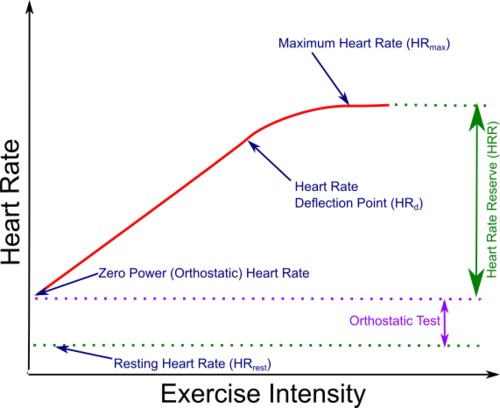Difference between revisions of "Heart Rate Reserve"
User:Fellrnr (User talk:Fellrnr | contribs) |
User:Fellrnr (User talk:Fellrnr | contribs) |
||
| Line 1: | Line 1: | ||
{{DISPLAYTITLE:Heart Rate Reserve (HRR)}} | {{DISPLAYTITLE:Heart Rate Reserve (HRR)}} | ||
[[File:HeartRateSimplified.png|right|thumb|500px|A simplified chart of heart rate against exercise intensity showing [[Maximum Heart Rate]], [[Heart Rate Reserve]], [[Resting Heart Rate]] and [[Heart Rate Deflection]].]] | [[File:HeartRateSimplified.png|right|thumb|500px|A simplified chart of heart rate against exercise intensity showing [[Maximum Heart Rate]], [[Heart Rate Reserve]], [[Resting Heart Rate]] and [[Heart Rate Deflection]].]] | ||
| − | Heart Rate Reserve (HRR) is the difference between your [[Maximum Heart Rate]] (HR<sub>max</sub>) and [[Resting Heart Rate]] (HR<sub>rest</sub>). Exercise intensity can be evaluated by comparing your heart rate as a percentage of HRR. The calculation to work out %HRR is (HR<sub>ex</sub> – HR<sub>rest</sub>)/(HR<sub>max</sub> – HR<sub>rest</sub>), where HR<sub>ex</sub> is the exercise Heart Rate. so a HR<sub>max</sub> of 180, a HR<sub>rest</sub> of 40 and HR<sub>ex</sub> of 140 would be (140 – 40)/(180 – 40), which is 71%. Using %HRR is better than a percentage of HR<sub>max</sub>. as it reflects the relative intensity more accurately. For example, if two athletes both have a HR<sub>max</sub> of 180, but one has a HR<sub>rest</sub> of 40 and the other 70, at HR<sub>ex</sub> of 140would be same %HR<sub>max</sub>, but one is at 64 %HRR and the other is at 71 %HRR. However, for '''HRR to be of value, you have to test your HR<sub>max</sub>, as it cannot be calculated'''. Most [[Heart Rate | + | Heart Rate Reserve (HRR) is the difference between your [[Maximum Heart Rate]] (HR<sub>max</sub>) and [[Resting Heart Rate]] (HR<sub>rest</sub>). Exercise intensity can be evaluated by comparing your heart rate as a percentage of HRR. The calculation to work out %HRR is (HR<sub>ex</sub> – HR<sub>rest</sub>)/(HR<sub>max</sub> – HR<sub>rest</sub>), where HR<sub>ex</sub> is the exercise Heart Rate. so a HR<sub>max</sub> of 180, a HR<sub>rest</sub> of 40 and HR<sub>ex</sub> of 140 would be (140 – 40)/(180 – 40), which is 71%. Using %HRR is better than a percentage of HR<sub>max</sub>. as it reflects the relative intensity more accurately. For example, if two athletes both have a HR<sub>max</sub> of 180, but one has a HR<sub>rest</sub> of 40 and the other 70, at HR<sub>ex</sub> of 140would be same %HR<sub>max</sub>, but one is at 64 %HRR and the other is at 71 %HRR. However, for '''HRR to be of value, you have to test your HR<sub>max</sub>, as it cannot be calculated'''. Most [[Heart Rate Monitor]]s will display your %HRR if you input your HR<sub>max</sub> and HR<sub>rest</sub>. |
=See Also= | =See Also= | ||
* [[Maximum Heart Rate]] | * [[Maximum Heart Rate]] | ||
Revision as of 13:50, 13 March 2014

Heart Rate Reserve (HRR) is the difference between your Maximum Heart Rate (HRmax) and Resting Heart Rate (HRrest). Exercise intensity can be evaluated by comparing your heart rate as a percentage of HRR. The calculation to work out %HRR is (HRex – HRrest)/(HRmax – HRrest), where HRex is the exercise Heart Rate. so a HRmax of 180, a HRrest of 40 and HRex of 140 would be (140 – 40)/(180 – 40), which is 71%. Using %HRR is better than a percentage of HRmax. as it reflects the relative intensity more accurately. For example, if two athletes both have a HRmax of 180, but one has a HRrest of 40 and the other 70, at HRex of 140would be same %HRmax, but one is at 64 %HRR and the other is at 71 %HRR. However, for HRR to be of value, you have to test your HRmax, as it cannot be calculated. Most Heart Rate Monitors will display your %HRR if you input your HRmax and HRrest.
See Also
- Maximum Heart Rate
- Resting Rate Reserve
- Pulse Oximeter
- Heart Rate Deflection